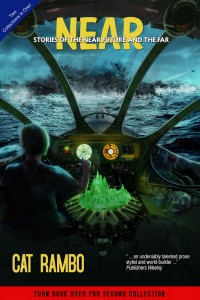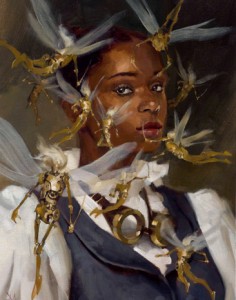 The following comes from an email exchange between myself and John Barnes, whose story I critiqued and who has given permission to reprint the exchange 🙂 I know that this question often comes up for newer writers. They see writers who write long, elaborate sentences and wonder why they then get criticized for overly long and complicated sentences.
The following comes from an email exchange between myself and John Barnes, whose story I critiqued and who has given permission to reprint the exchange 🙂 I know that this question often comes up for newer writers. They see writers who write long, elaborate sentences and wonder why they then get criticized for overly long and complicated sentences.
John: When you said to work on writing on a sentence /paragraph level, were you referring to sentence structure or cutting needless words? Was it well-written? Would a good play on muscle memory to intersperse the story with flashes of memory, along the lines of what Aliette De Bodarde did with immersion?
The answer to the question in the first sentence is yes to both. I think that you are at a point in your writing where you should both be looking at constructing interesting, graceful sentences as well as making sure that you remove excess words. Extraneous language often gets in the way of a story’s speaking to a reader, muffling its impact.
I thought the language was competent, but still needs the final polish that removes any awkwardness or places where the prose calls attention to itself. One of the ways a writer convinces the reader to relax and give into the experience of the story is by convincing them they are in expert hands that will keep reminders that they are reading to a minimum. Awkward sentences or passages that are overly wordy can remind a reader that they are reading and generally are experienced as a negative rather than a positive.
Absolutely a good play on muscle memory that intersperses the story with flashes of memory would be great. To make it superlative, the language needs to be constructed as clearly as possible. If you go over “Immersion,” you will see that in every sentence, words are pulling their weight and there are no extras.
John: Thanks, so keep it simple then? What about writers like Cat Valente or Laird Barron who usually have flowery prose in their writing? On Neil Clarke’s sub page for Clarkesworld he says “language is important, there’s no distinction between “style” and “substance” or “story” and “writing”. What exactly did he mean by that? I only ask because you have many stories published in their issues and that ezine is like the uncatchable unicorn for writers like me. lol Thanks again.
If you look at Cat Valente or Laird Barron’s prose you’ll see that although it is flowery, every word in it is still doing something.
To see what I mean, let’s look at a passage from both of them. Here is one of Valente’s, from Silently and Very Fast in Clakesworld:
Ravan told me these stories. He set up a great hexagonal library in his Interior, as dusty and dun-colored and labyrinthine as any ancient scriptorium. He made himself a young novice with a fresh-shaven tonsure, and me a country friar with a red, brandy-drinking nose. He showed me the illuminator’s table, and a great book whose pages had golden edges and illuminations in cobalt and oxblood and Tyrian purple, and the images showed great machine armies trampling men underfoot. They showed cruel metal faces and distant, god-like clouds of intellect: incomprehensible and vast and uncaring. They showed the Good Robot desperately asking what love was. They showed fatal malfunctions and mushroom clouds. They showed vicious weapons and hopeless battles, noble men and women with steady gazes facing down their cruel and unjust artificial children, who gave no mercy.
These are complex sentences at times. They employ poetic techniques, such as the repetition of “They showed” as well as the deliberately repeated conjunction “and” of “cobalt and oxblood and Tyrian purple”. Notice how the “They showed” becomes like pages flipping.
But there are no extraneous words, no words that are not accomplishing at least several of the following duties: constructing a world for the reader, conveying information about the world, creating a specific tone, amplifying the engaging nature of the prose with sensory detail, providing aural delight when mentally read, providing beautiful or entertaining language, etc.
Here’s a passage from Laird Barron’s Blood & Stardust, which features a protagonist that has some similarities with yours.
My nerves weren’t always so frayed; once, I was too dull to fear anything but the Master’s voice and his lash. I was incurious until my fifth or sixth birthday and thick as a brick physically and intellectually. Anymore, I read anything that doesn’t have the covers glued shut. I devour talk radio and Oprah. Consequently, my neuroses have spread like weeds. Am I getting fat? Yes, I’ve got the squat frame of a Bulgarian power lifter, but at least my moles and wens usually distract the eye from my bulging trapeziuses and hairy arms.
I also dislike the dark, and wind, and being trussed hand and foot and left hanging in a closet. Dr. Kob used to give me the last as punishment; still does it now and again, needed or not, as a reminder. Perspective is extremely important in the Kob house. The whole situation is rather pathetic, because chief among his eccentric proclivities, he’s an amateur storm chaser. Tornadoes and cyclones don’t interest him so much as lightning and its capacity for destruction and death. Up until his recent deteriorating health, we’d bundle into the van and cruise along the coast during storm season and shoot video, and perform field tests of his arcane equipment. Happily, those days seem to be gone, and none too soon. It’s rumored my predecessor, daughter numero uno, was blown to smithereens, and her ashes scattered upon the tides, during one of those summer outings.
Here again, sentences are leanly fleshed and adverbs like “rather” and “extremely” are used sparingly. Notice that sentences are not uniformly long. The average sentence is 12 words long, so let’s see how Barron’s passage maps against that. Its sentences by word count go 20/17/11/5/7/4/29/20/23/8/17/30/11/24. Looking at that, you can see how although usually sentences are longer than average, some short ones are interspersed, creating what I would describe as texture or perhaps rhythm, to the writing. Along the same lines, look at the Valente sentences by word count: 5/20/20/34/16/10/7/26.
This is important but subtle stuff, and I am not suggesting that anyone needs to go through and count the words in their sentences, just that they do need to consider length. Writers don’t have to just construct stories on the level of character and situation. They must also convey that story through sentences that are constructed as optimally as possible to deliver the experience of the story to the reader.
I think this is why it Neil Clarke is referencing on the submissions page. He wants stories that pay attention not just to the plotting, that the language in which it is conveyed and the skill with which the experience is created for the reader. This is one of the hard to acquire but essential skills that end up elevating writing from good to great, in my opinion.
John: Thanks for clearing that up, now that I look at it more closely, I can see that the sentences aren’t that complex, just seem dense when read as a whole. And there are very few “dress-up” words. Does a writer need poetic techniques to give the story quality? Asimov’s and some of the work in F&SF have pretty transparent prose?
I don’t know that a writer needs poetic techniques, but they certainly help. A story has to have some reason for the reader to want to keep going — beauty of style helps but it’s not enough. There must also be plot and the characters and the cool world-building, etc. Some writers get by on something else and stick to a very plain — and sometimes downright awkward, hence my reluctance to say “needs” — prose, but they’re going full out with killer plots or heart-wringing characters or snappy dialogue, all in spades.
For me sometimes a dense style — one with conscious use of poetic technique, symbology, and sensory input — has worked well, and it is something that seems to appeal to Clarkesworld.
Here’s a sample passage from The Worm Within, which appeared there. It’s meant to be read aloud, and plays with repeated sounds. It’s also an unreliable narrator and the sentence structures are meant to provide a sense of unease in the reader, as are some of the sensory details.
But after only a single pirouette, my inner tenant stirs. He plucks pizzicato at my spine, each painful twang reminding me of his presence, somewhere inside.
He says, They’ll find you soon enough TICK they’ll hunt you down. They’ll realize TICK what you are, a meat-puppet in a TICK robot world, all the shiny men and women and TICK in-betweens will cry out, knowing what you are. They’ll find TICK you. They’ll find you.
Here is a section where I use plainer language, in another Clarkesworld story, “The Mermaids Singing, Each to Each”.
Sometimes I used to imagine crashing her on a reef and swimming away, leaving her to be covered with birdshit and seaweed, her voice lasting, pleading, as long as the batteries held out. Sometimes I used to imagine taking one of the little cutting lasers, chopping away everything but her defenseless brainbox, deep in the planking below the cabin, then severing its inputs one by one, leaving her alone. Sometimes I imagined worse things.
I inherited her from my uncle Fortunato. My uncle loved his boat like a woman, and she’d do things for him, stretch out the last bit of fuel, turn just a bit sharper, that she wouldn’t do for me or anyone else. Like an abandoned woman, pining for a lover who’d moved on. I could have the AI stripped down and retooled, re-imprint her, but I’d lose all her knowledge. Her ability to recognize me.
I tried in this passage to convey something about the main character’s emotional state. When it breaks into more poetic language with the repeated “Sometimes I used to imagine beginning each sentence” the repeated structure is intended to intensify the emotion that underlines the passage, the deep anger that the protagonist feels towards the Mary Magdalena.
In conclusion, I hope these examples have shown that studying poetry is not time wasted for a writer, particularly when learning strategies involving repeated sounds, rhythms, and figures of speech. That sort of attention to detail is what leads to the degree of skill that allows a writer to get away with “wordy” prose.
Enjoy this writing advice and want more content like it? Check out the classes Cat gives via the Rambo Academy for Wayward Writers, which offers both on-demand and live online writing classes for fantasy and science fiction writers from Cat and other authors, including Ann Leckie, Seanan McGuire, Fran Wilde and other talents! All classes include three free slots.
Prefer to opt for weekly interaction, advice, opportunities to ask questions, and access to the Chez Rambo Discord community and critique group? Check out Cat’s Patreon. Or sample her writing here.






